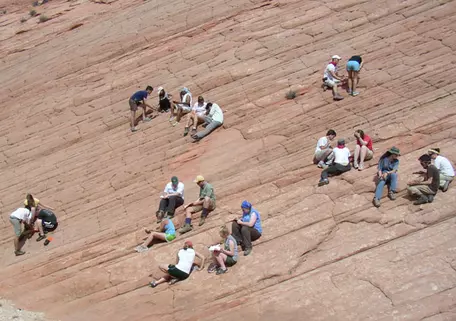Context Diversity: A New Paradigm for Equity and Inclusion in Higher Education
Monday, October 22, 2018
10:00 am PT | 11:00 am MT | 12:00 pm CT | 1:00 pm ET
Presenters: Gary Weissmann and Roberto Ibarra (University of New Mexico)
This webinar is part of a series supporting teaching with InTeGrate principles, using InTeGrate-developed and curated materials as tools.
Registration is closed.
Summary

Goals
At the end of this webinar, participants will:
- Be introduced to Multicontext Theory and Context Diversity;
- Be able to see how Context Diversity may influence their teaching, research, and academic careers;
- Be provided with examples of how to activate Context Diversity concepts in their departments and classrooms.
Logistics
Time - 10:00 am PT | 11:00 am MT | 12:00 pm CT | 1:00 pm ET
Duration - 1 hour
Format - Online web presentation via Zoom meeting software with questions and discussion. Go to the webinar technology page for information on using Zoom. Detailed instructions for joining the webinar will be emailed to registered participants one day prior to the webinar.
Preparation - There is no advance preparation required for this webinar.
Registration is closed.
Please email Mitchell Awalt (mawalt@carleton.edu) if you have any questions about this event.
Presenters
Gary Weissmann, Albert and Mary Jane Black Professor in Hydrogeology, Earth and Planetary Sciences, University of New Mexico
Roberto Ibarra, Emeritus Professor of Sociology, University of New Mexico
Program
Slide set: Webinar - Context Diversity Slides (Acrobat (PDF) 2.2MB Oct20 18)
1) Welcome and introductory remarks – Mitchell Awalt, SERC
2) Introduction: Why aren't current diversity initiatives succeeding?
3) Activity: Reflection on your institution/department in cultural context
4) Multicontext Theory and Context Diversity explained
5) Practical examples for activating Context Diversity in your realm
6) Concluding remarks and questions
7) Opportunities for further interaction - Mitchell Awalt, SERC
8) Webinar Evaluation
Resources
- References of interest:
- Ibarra, RA, 2001, Beyond Affirmative Action: Reframing the Context of Higher Education, University of Wisconsin Press, Madison, 323p.
- Chávez, AF, and Longerbeam, SD, 2016, Teaching Across Cultural Strengths: A guide to balancing integrated and individuated cultural frameworks in college teaching, Stylus Press, Sterling VA, 241p.
- Context Diversity Matrix (Acrobat (PDF) 1.6MB Oct20 18)
- Community Discussion

